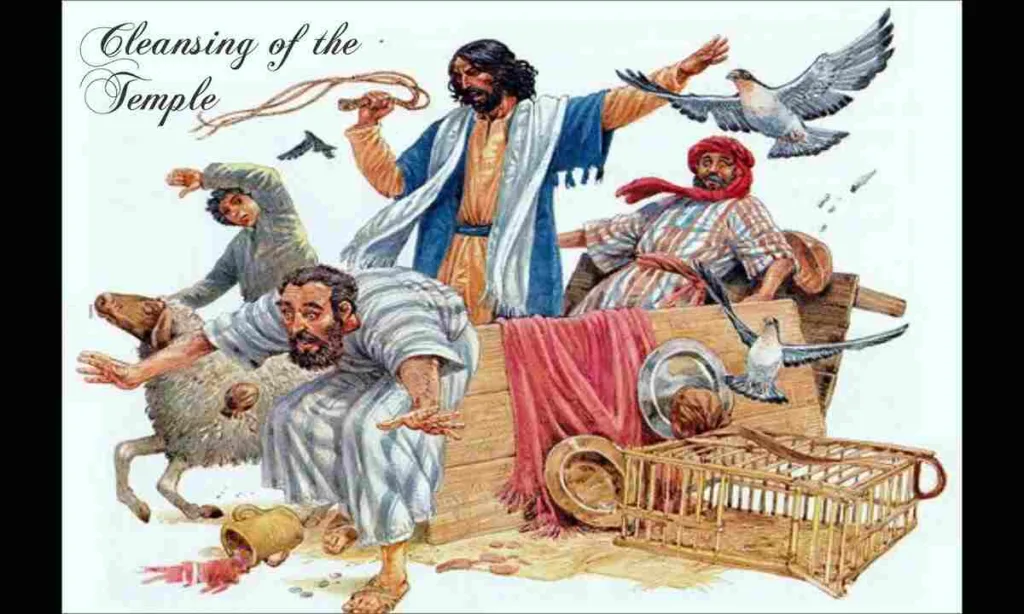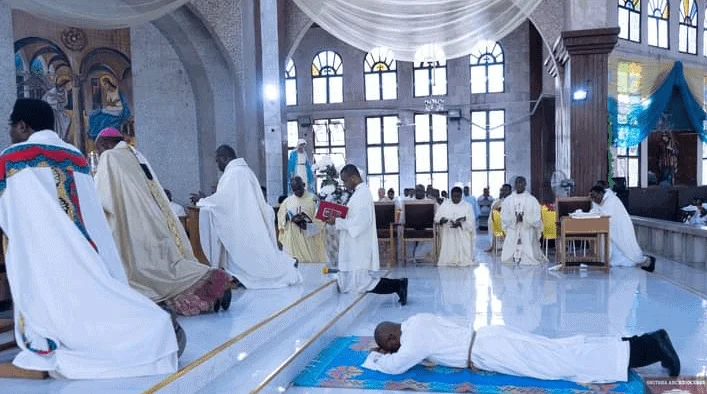Homily of Third Sunday of Lent, Year B
First Reading (Exodus 20:1–17); Second Reading (1 Corinthians 1:22–25); Gospel (John 2:13-25)
Today we celebrate the third Sunday in the period of Lent, year B. It is a time when Christ calls us through the Church to return to God with mourning, fasting, and weeping, and to purify ourselves through mortification and acts of bodily discipline. In today’s gospel, Christ demonstrates an act of purification in the temple. This is a significant event in Christian history that resonates with us to this day. So, join me as we reflect on the readings of today and receive the graces we need for our spiritual growth.
Diminishing Reverence for God’s Temple in our Contemporary Society
In our contemporary society, there is a troubling trend of diminishing reverence for God’s temple. Many Christians do not have any atom of reverence for God’s Temple again. They no longer fear or respect sacred objects in the house of God. Some of them may even commit atrocious acts in the church while still swearing to the Bible, Blessed Sacrament, etc. in order to deny their actions. But when it comes to traditional effigies or local deities, they tremble with fear. What an aberration!
This disconnect raises questions about the essence of our worship and the condition of our hearts, as the world’s distractions and a culture of convenience often overshadow contemplation and reverence for the divine presence. Perhaps this could be one of the reasons why God allows us to face difficulties most of the time. Even when we call Him, He does not answer (Proverbs 1:22-31).
The Ten Commandments: A Divine Guide for Worship

The first reading presents us with the Ten Commandments of God, which can be summarized into two aspects: the love of God and the love neighbour. These commandments are foundational to religious and moral behaviour. They remind us of God’s deliverance from Egypt, symbolizing liberation and a new life under divine guidance. Also, they set the tone for an exclusive relationship with God, emphasizing that no other gods should take precedence in our lives. God desires that we live by them so that we can attain the joys of being reunited with Him and thus, gain eternal life.
The Significance of God’s Commandments
The first four commandments concerning the use of God’s name, the observance of the Sabbath, and the honouring of one’s parents are about respect for God and for the family structure. These principles encourage us to live with a sense of sacredness in all aspects of life. The latter commandments, which include prohibitions against murder, adultery, theft, false witness, and covetousness, serve as ethical guidelines that promote social harmony and personal integrity.

They remind us of the impact of our actions on others and the importance of fostering trust and respect within our community. Undoubtedly, these commandments emphasize God’s justice and mercy, warning of consequences for those who reject His ways yet promising steadfast love to those who follow His commandments.
The Spirit Behind God’s Commandments
The spirit behind the commandments of God is rooted in love, compassion, and justice, aiming to protect and uplift the weak and vulnerable in society. They serve as a moral compass, guiding the strong to use their power for the betterment of all rather than oppress or overshadow those who are less privileged. They also aim to promote order, respect, and peace within society.
Ultimately, the commandments seek to create a society where the vulnerable are shielded from exploitation and where all individuals can flourish and thrive. Just as Christ says, “So in everything, do to others what you would have them do to you, for this sums up the Law and the Prophets” (Matthew 7:12).
Cleansing the Temple: Jesus’ Zeal for True Worship

The gospel reading recounts the story of the purification of the temple, or rather, the replacement of the old temple with a new one. Jesus’ cleansing of the Temple connects to the spiritual reading of the Ten Commandments. Both emphasize the importance of reverence for God and the sanctity of worship.
The actions of the money changers in the temple were tantamount to disobedience to the first commandment. Hence, Jesus’ actions in the Temple reflect a zeal for the purity of worship and the rejection of idolatrous practices. He is always unhappy when people put their business and trade before God, even in the very house of God.
God’s Holy Temple Demands Our Reverence

The respect owed to God extends to His house, the place set aside for worship. Jesus’ reactions in the gospel demonstrate the importance He placed on the sanctity of the House of God. It was really quite unlike Him. Ordinarily, Jesus Christ is a gentle, kind, tolerant, peaceful, and empathetic person. But on this very occasion, He was very angry, to the point of becoming violent. Wow! This demonstrates the spiritual significance and sanctity of the House of God.
If the Jewish Temple was revered in this manner, how much more should be given to our present Church, where the real presence of the Son of God in the Holy Eucharist is reserved in the tabernacle? Hence, God’s holy temple should not be turned into a marketplace; rather, it must be revered as a sacred place for worship.
Our Body is God’s Temple

In the second reading, St. Paul warns us not to be reasoning like the ancient “Jews” and “Greeks,” who always demanded signs in order to believe. But rather, to proclaim Christ, who is the power and wisdom of God, with faith. We should not trivialize the efficacy of God’s Commandments and Temple as mere words and buildings, respectively. But to always have reverence for them.
Moreover, our bodies are a gift from God, and as such, we should strive to keep them pure and holy. So, we are called to treat our bodies with respect. Maintain them in good health, and use them to glorify God in all that we do. As the scripture says, “Do you not know that your bodies are temples of the Holy Spirit, who is in you, whom you have received from God? You are not your own; you were bought at a price. Therefore, honour God with your bodies” (1 Corinthians 6:19–20).
God’s Temple needs Spiritual Purification

We are the new temple, but, like the old, we also often need purification from all that hinders our offering to God acceptable sacrifices. Just as the physical temple in Jerusalem served as a place of worship and reverence, our bodies are also meant to be honored as vessels of God’s presence. By nourishing our bodies with wholesome food, exercising regularly, and avoiding harmful substances, we can honour the temple of God within us. Therefore, we must be ready to purify the temple of God (our body) of greed, dishonesty, envy, jealousy, hatred, corruption, injustice, nepotism, betrayal, etc.
Conclusion
As we continue our Lenten journey, we are called to always reverence God’s commandments and temple. Our churches are not like other venues; they are sacred spaces dedicated to God’s glory. Jesus Christ told His disciples, “If you love me, you will obey my commandments” (John 14:15). We need to obey God’s commandments. One thing is to build a magnificent house for God with beautiful and attractive materials that inspire and move people to pray well without distraction; another is to make it worthy of Him.
Therefore, let us always strive to honour God with our bodies, recognizing the divine presence within us. Let us strive to keep ourselves holy, pure, and free from desecration, to be dwelling places for God. Also, living in a way that reflects the reverence and gratitude we have for this precious gift.
Prayer
May God enable us with His grace to practice holiness and virtue through prayer, fasting, charity, love, forgiveness, mercy, compassion, justice, and peace, dedicating ourselves to Him for His glory. May He give us the grace to be faithful to them through Christ, our Lord. Amen.
Peace of Christ be with you…
Rev. Fr. Benjamin Okala, C.S.Sp.



